牛津英语八年级下册知识点梳理
- 格式:docx
- 大小:72.96 KB
- 文档页数:20
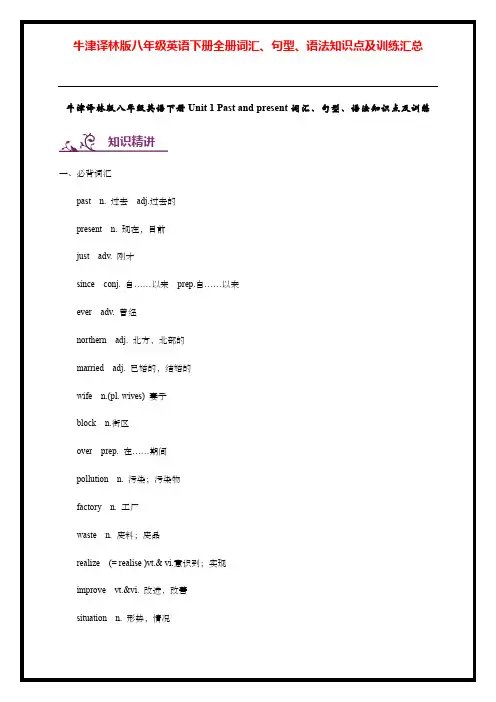
牛津译林版八年级英语下册Unit 1 Past and present词汇、句型、语法知识点及训练知识精讲一、必背词汇past n. 过去adj.过去的present n. 现在,目前just adv. 刚才since conj. 自……以来prep.自……以来ever adv. 曾经northern adj. 北方,北部的married adj. 已婚的,结婚的wife n.(pl. wives) 妻子block n.街区over prep. 在……期间pollution n. 污染;污染物factory n. 工厂waste n. 废料;废品realize (= realise )vt.& vi.意识到;实现improve vt.&vi. 改进,改善situation n. 形势,情况impossible adj. 不可能的before adv.以前,过去lonely adj. 孤独的,寂寞的anyway adv. 尽管,即使这样husband n. 丈夫interview n. 采访;会见yet adv. 还,仍recently adv.近来,最近environment n. 环境transport n.交通车辆,运输工具condition n. 环境,条件,状况return vi. 返回last adv.最近,上一次;最后abroad adv. 到(在)国外primary adj. 小学教育的;初级的communicate vt. &vi. 交流,交际exactly adv.(答语)正是,没错narrow adj. 狭窄的二、重点词汇1. present noun /ˈprez.ənt/1). something that you are given, without asking for it, on a special occasion, especially to showfriendship, or to say thank you(尤指表示友谊或致谢的)礼物,赠品例句:They gave me theatre tickets as a present.他们送给我戏票作为礼物。
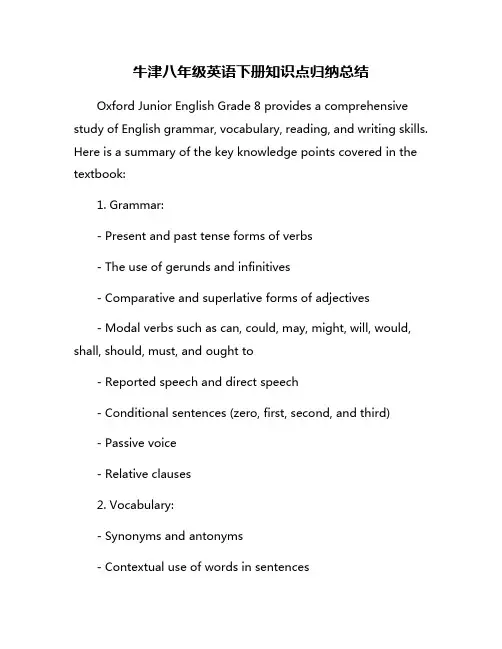
牛津八年级英语下册知识点归纳总结Oxford Junior English Grade 8 provides a comprehensive study of English grammar, vocabulary, reading, and writing skills. Here is a summary of the key knowledge points covered in the textbook:1. Grammar:- Present and past tense forms of verbs- The use of gerunds and infinitives- Comparative and superlative forms of adjectives- Modal verbs such as can, could, may, might, will, would, shall, should, must, and ought to- Reported speech and direct speech- Conditional sentences (zero, first, second, and third)- Passive voice- Relative clauses2. Vocabulary:- Synonyms and antonyms- Contextual use of words in sentences- Phrasal verbs- Idioms and expressions- Prefixes and suffixes- Homophones and homographs- Word formation (nouns, verbs, adjectives, adverbs)3. Reading:- Comprehension passages with different text types (narrative, descriptive, expository, persuasive)- Identifying main ideas and supporting details- Inference and predicting outcomes- Summarizing texts- Recognizing literary devices (simile, metaphor, personification, alliteration, onomatopoeia)4. Writing:- Paragraph and essay writing- Narrative, descriptive, and argumentative writing- Using appropriate linking words and phrases- Organizing ideas cohesively- Structure of a formal letter and email- Creative writing techniquesOverall, the Oxford Junior English Grade 8 textbook offers a well-rounded English language curriculum that helps students improve their language skills in grammar, vocabulary, reading, and writing. By mastering these knowledge points, students can better communicate and express themselves effectively in English.。
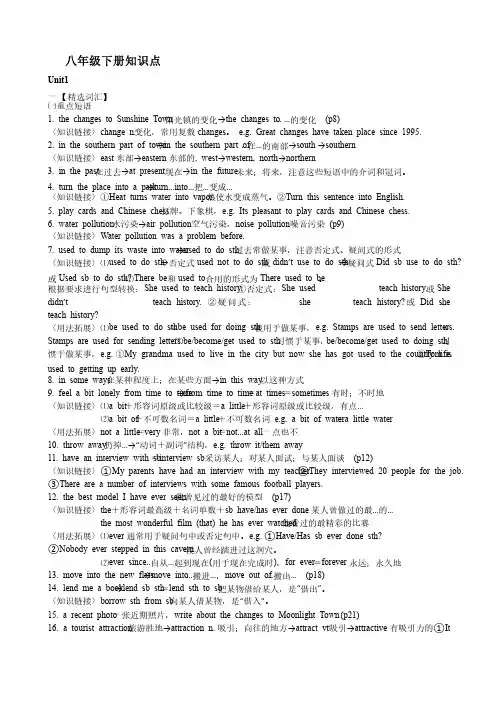
八年级下册知识点Unit1 一【精选词汇】【精选词汇】㈠重点短语㈠重点短语1. the changes to Sunshine Town 阳光镇的变化→the changes to … …的变化的变化 (p8)〈知识链接〉change n.变化,常用复数变化,常用复数changes 。
e.g. Great changes have taken place since 1995.2. in the southern part of town →in the southern part of …在…的南部→south →southern〈知识链接〉east 东部→eastern 东部的, west →western, north →northern 3. in the past 在过去→at present 现在→in the future 未来;将来,注意这些短语中的介词和冠词。
未来;将来,注意这些短语中的介词和冠词。
4. turn the place into a park →turn …into …把…变成…〈知识链接〉①Heat turns water into vapor.热使水变成蒸气。
②Turn this sentence into English.5. play cards and Chinese chess 打牌、下象棋,e.g. It ’s pleasant to play cards and Chinese chess.6. water pollution 水污染→air pollution 空气污染,noise pollution 噪音污染噪音污染 (p9)〈知识链接〉Water pollution was a problem before. 7. used to dump its waste into water →used to do sth 过去常做某事,注意否定式、疑问式的形式过去常做某事,注意否定式、疑问式的形式过去常做某事,注意否定式、疑问式的形式 〈知识链接〉⑴used to do sth →否定式used not to do sth 或didn ’t use to do sth→疑问式Did sb use to do sth?或Used sb to do sth? ⑵There be 和used to 合用的形式为There used to be 。
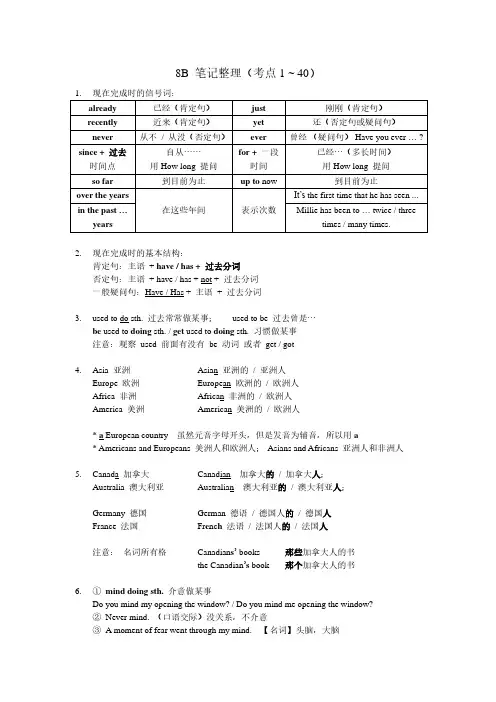
8B 笔记整理(考点1 ~ 40)1. 现在完成时的信号词:2. 现在完成时的基本结构:肯定句:主语+ have / has + 过去分词否定句:主语+ have / has + not + 过去分词一般疑问句:Have / Has + 主语+ 过去分词3. used to do sth. 过去常常做某事;used to be 过去曾是…be used to doing sth. / get used to doing sth. 习惯做某事注意:观察used 前面有没有be 动词或者get / got4. Asia 亚洲Asian 亚洲的/ 亚洲人Europe 欧洲European 欧洲的/ 欧洲人Africa 非洲African 非洲的/ 欧洲人America 美洲American 美洲的/ 欧洲人* a European country 虽然元音字母开头,但是发音为辅音,所以用a* Americans and Europeans 美洲人和欧洲人; Asians and Africans 亚洲人和非洲人5. Canada 加拿大Canadian 加拿大的/ 加拿大人;Australia 澳大利亚Australian 澳大利亚的/ 澳大利亚人;Germany 德国German 德语/ 德国人的/ 德国人France 法国Fr e nc h 法语/ 法国人的/ 法国人注意:名词所有格Canadian s’ books 那些加拿大人的书the Canadian’s book 那个加拿大人的书6. ①mind doing sth.介意做某事Do you mind my opening the window? / Do you mind me opening the window?②Never mind. (口语交际)没关系,不介意③ A moment of fear went through my mind. 【名词】头脑,大脑7. 句型The best time to do sth.The best time to visit the UK is … / from … to …Sunshine Park is a wonderful place to fly kites.* 与time / place 相关的句型(表示最佳时间、最佳地点)使用to do 结构;* 短语have a good time doing sth. 使用doing 结构8. east 东方east ern东方的;west 西方west ern西方的;south 南方south ern南方的;north 北方north ern北方的;at the southern end of …在…的最南端;Western restaurants 西餐馆(表示西方文化、艺术的时候需要大写)9. can’t help / stop doing sth. 情不自禁做某事/ 忍不住做某事stop doing sth. 停止正在做的事;stop to do sth. 停下手中的事去做一件新事情10. to do 不定式表示目的(理解句意,在翻译句子的基础上理解目的的表达)We must try our best to stop the pollution to live (live) a happy life. 为了…11. be interested in doing sth. She is interested in reading novels. 对…感兴趣show an interest in doing sth. She shows an interest in reading novels.interested (感到)有兴趣的interesting 令人感兴趣的bored (感到)无聊的boring 令人感到无聊的excited (感到)兴奋的exciting 令人感到兴奋的relaxed (感到)放松的relaxing 令人放松的12. 序数词第…in the early / late twentieth century 在(第)二十世纪早/晚期区分:in the / one’s thirties 名词复数形式意思是30~39之间She is in his thirties.thirtieth 序数词意思是第三十celebrate her thirtieth birthday基数词变序数词14. hear / see sb. do sth. 听见/看见某人做事的全过程hear / see sb. doing sth. 听见/看见某人做事的一瞬间注意:经常听见或看见的是全过程I often hear the birds sing.比较级的基本结构:比较级+ than最高级的基本结构:the + 最高级16. 区分:形容词的比较级和形容词变副词* I find it easier than before to complete the task.* Susan can work out the problem easily. 轻松地解决难题副词修饰动词* 修饰比较级much / even / a little + 比较级+ than* 注意:further information / study / help …(程度)更进一步的;Further on …再往前区分:tasty = delicious 美味的;tasteful 有品味的;雅致的18. 反义词前缀un-, in-, im- 意思是not注意:读懂句意,准确判断词性,在理解句子意思的基础上补充词缀。
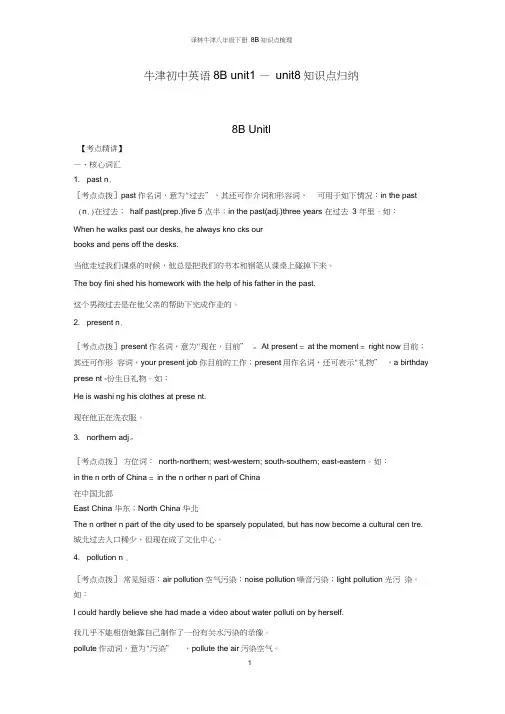
牛津初中英语8B unit1 —unit8知识点归纳8B Unitl【考点精讲】—、核心词汇1. past n.[考点点拨]past作名词,意为"过去”,其还可作介词和形容词,可用于如下情况:in the past (n.)在过去;half past(prep.)five 5 点半;in the past(adj.)three years 在过去 3 年里。
如:When he walks past our desks, he always kno cks ourbooks and pens off the desks.当他走过我们课桌的时候,他总是把我们的书本和钢笔从课桌上碰掉下来。
The boy fini shed his homework with the help of his father in the past.这个男孩过去是在他父亲的帮助下完成作业的。
2. present n.[考点点拨]present作名词,意为"现在,目前” 。
At present = at the moment = right now目前;其还可作形容词,your present job你目前的工作;present用作名词,还可表示"礼物” ,a birthday prese nt -份生日礼物。
如:He is washi ng his clothes at prese nt.现在他正在洗衣服。
3. northern adj。
[考点点拨]方位词:north-northern; west-western; south-southern; east-eastern。
如:in the n orth of China = in the n orther n part of China在中国北部East China 华东;North China 华北The n orther n part of the city used to be sparsely populated, but has now become a cultural cen tre. 城北过去人口稀少,但现在成了文化中心。
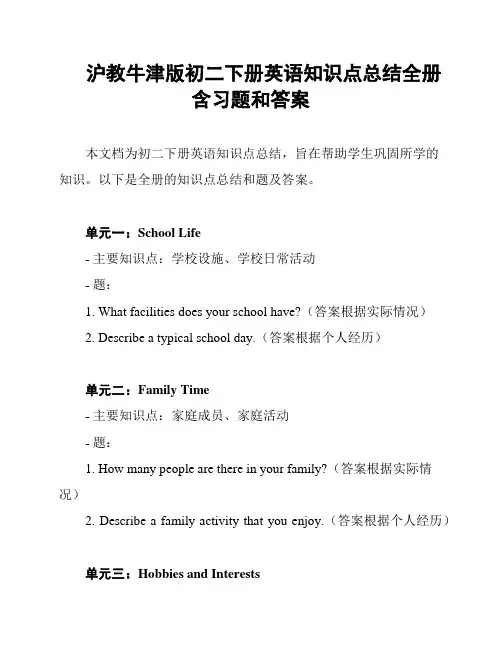
沪教牛津版初二下册英语知识点总结全册含习题和答案本文档为初二下册英语知识点总结,旨在帮助学生巩固所学的知识。
以下是全册的知识点总结和题及答案。
单元一:School Life- 主要知识点:学校设施、学校日常活动- 题:1. What facilities does your school have?(答案根据实际情况)2. Describe a typical school day.(答案根据个人经历)单元二:Family Time- 主要知识点:家庭成员、家庭活动- 题:1. How many people are there in your family?(答案根据实际情况)2. Describe a family activity that you enjoy.(答案根据个人经历)单元三:Hobbies and Interests- 主要知识点:爱好和兴趣、表达喜欢与不喜欢- 题:1. What is your favorite hobby? Why?(个人回答)2. List three things you like and three things you don't like.(个人回答)单元四:Healthy Living- 主要知识点:健康生活方式、饮食和运动- 题:1. What do you do to stay healthy?(个人回答)2. Describe a healthy meal.(个人回答)单元五:Travel and Adventure- 主要知识点:旅行和冒险、地理和文化知识- 题:1. Describe a place you would like to visit and why.(个人回答)2. What is a famous landmark in your country?(个人回答)单元六:Technology and Innovation- 主要知识点:科技和创新、数字产品和服务- 题:1. How has technology changed your life?(个人回答)2. What is your favorite digital device or service?(个人回答)- 主要知识点:语言和交流、不同国家和文化的语言- 题:1. How many languages can you speak?(个人回答)2. List three words in a language other than English.(个人回答)单元八:Entertainment and Media- 主要知识点:娱乐和媒体、影视作品和音乐- 题:1. What is your favorite movie or TV show? Why?(个人回答)2. Describe a song or piece of music you like.(个人回答)以上是沪教牛津版初二下册英语的知识点总结和题及答案。
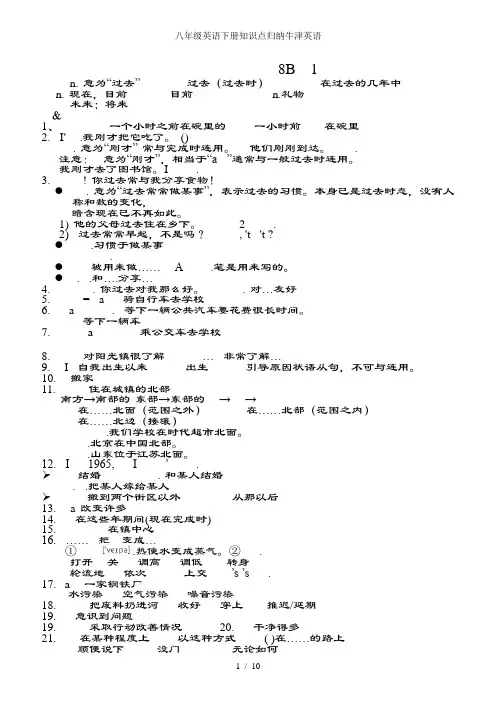
八年级英语下册知识点归纳牛津英语8B 1n. 意为“过去” 过去(过去时)在过去的几年中n. 现在,目前目前n.礼物未来;将来&1、一个小时之前在碗里的一小时前在碗里2. I' .我刚才把它吃了。
(). 意为“刚才” 常与完成时连用。
他们刚刚到达。
.注意:意为“刚才”,相当于“a ”通常与一般过去时连用。
我刚才去了图书馆。
I .3. ! 你过去常与我分享食物!● . 意为“过去常常做某事”,表示过去的习惯。
本身已是过去时态,没有人称和数的变化,暗含现在已不再如此。
1) 他的父母过去住在乡下。
2 .2) 过去常常早起,不是吗?, 't 't ?● .习惯于做某事.●被用来做…… A .笔是用来写的。
● . .和….分享…4. . 你过去对我那么好。
. 对…友好5. = a 骑自行车去学校6. a . 等下一辆公共汽车要花费很长时间。
等下一辆车7. a 乘公交车去学校8. 对阳光镇很了解… 非常了解…9. I 自我出生以来出生引导原因状语从句,不可与连用。
10. 搬家11. 住在城镇的北部南方→南部的东部→东部的→ →在……北面(范围之外)在……北部(范围之内)在……北边(接壤).我们学校在时代超市北面。
.北京在中国北部。
.山东位于江苏北面。
12. I 1965, I ’ .➢结婚 . 和某人结婚. .把某人嫁给某人➢搬到两个街区以外从那以后13. a 改变许多14. 在这些年期间(现在完成时)15. 在镇中心16. …… 把…变成…①.热使水变成蒸气。
② .打开关调高调低转身轮流地依次上交’s ’s .17. a 一家钢铁厂水污染空气污染噪音污染18. 把废料扔进河收好穿上推迟/延期19. 意识到问题19. 采取行动改善情况20. 干净得多21. 在某种程度上以这种方式( )在……的路上顺便说下没门无论如何八年级英语下册知识点归纳牛津英语22. a 拥有一个美丽现代化的城镇23. 我的大多数老朋友24 搬走25. .. .若形容词是描述行为者的性格、品质的,如,,,,,,等,用 .。
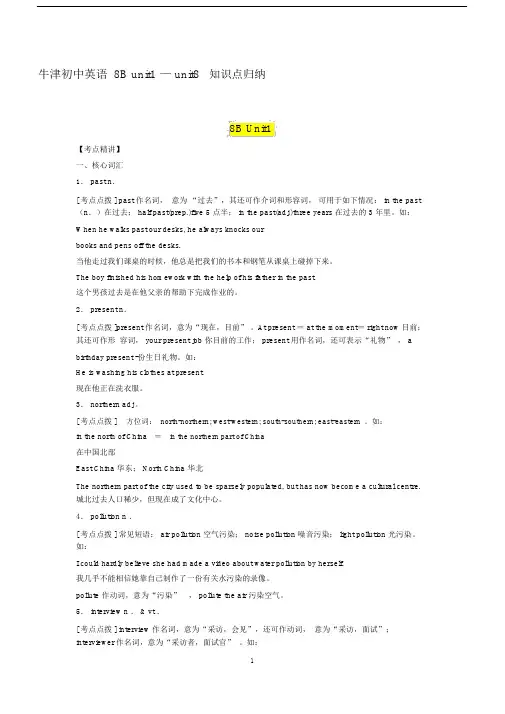
牛津初中英语8B unit1 — unit8知识点归纳8B Unit1【考点精讲】一、核心词汇1. past n.[ 考点点拨 ] past 作名词,意为“过去”,其还可作介词和形容词,可用于如下情况: in the past(n.)在过去; half past(prep.)five 5 点半; in the past(adj.)three years 在过去的 3 年里。
如:When he walks past our desks, he always knocks ourbooks and pens off the desks.当他走过我们课桌的时候,他总是把我们的书本和钢笔从课桌上碰掉下来。
The boy finished his homework with the help of his father in the past.这个男孩过去是在他父亲的帮助下完成作业的。
2. present n.[ 考点点拨 ]present 作名词,意为“现在,目前”。
At present = at the moment= right now 目前;其还可作形容词, your present job 你目前的工作; present 用作名词,还可表示“礼物” , abirthday present -份生日礼物。
如:He is washing his clothes at present.现在他正在洗衣服。
3. northern adj 。
[ 考点点拨 ]方位词:north-northern; west-western; south-southern; east-eastern。
如:in the north of China=in the northern part of China在中国北部East China 华东; North China 华北The northern part of the city used to be sparsely populated, but has now become a cultural centre.城北过去人口稀少,但现在成了文化中心。
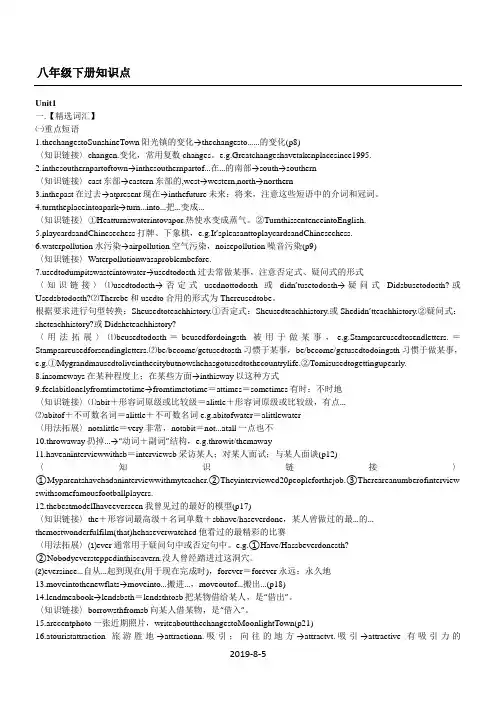
八年级下册知识点Unit1一.【精选词汇】㈠重点短语1.thechangestoSunshineTown阳光镇的变化→thechangesto……的变化(p8)〈知识链接〉changen.变化,常用复数changes。
e.g.Greatchangeshavetakenplacesince1995.2.inthesouthernpartoftown→inthesouthernpartof…在…的南部→south→southern〈知识链接〉east东部→eastern东部的,west→western,north→northern3.inthepast在过去→atpresent现在→inthefuture未来;将来,注意这些短语中的介词和冠词。
〈知识链或②疑问式:〈用法拓=e.g.①⑵abitof〈〉①12.thebestmodelIhaveeverseen我曾见过的最好的模型(p17)〈知识链接〉the+形容词最高级+名词单数+sbhave/haseverdone,某人曾做过的最…的…themostwonderfulfilm(that)hehaseverwatched他看过的最精彩的比赛〈用法拓展〉⑴ever通常用于疑问句中或否定句中。
e.g.①Have/Hassbeverdonesth?②Nobodyeversteppedinthiscavern.没人曾经踏进过这洞穴。
⑵eversince…自从…起到现在(用于现在完成时),forever=forever永远;永久地13.moveintothenewflats→moveinto…搬进…,moveoutof…搬出…(p18)14.lendmeabook→lendsbsth=lendsthtosb把某物借给某人,是“借出”。
〈知识链接〉borrowsthfromsb向某人借某物,是“借入”。
15.arecentphoto一张近期照片,writeaboutthechangestoMoonlightTown(p21)16.atouristattraction旅游胜地→attractionn.吸引;向往的地方→attractvt.吸引→attractive有吸引力的①Ithasbecomeanewtouristattraction.②Hepburn’sbeautyandcharmattractedColette’sattention.㈡词汇解析1.常见的交通工具:bike/bicycle,bus,double-decker双层巴士,coach长途汽车,tram有轨电车,taxi,train,underground,lightrail轻轨,plane,hot-airballoon热气球,aerodone滑翔机ingadictionary:Thewordsinadictionaryareinalphabeticalorderfrom“A”to“Z”.Thishelpsusfindthewordswewantquickly. Iftwowordsstartswiththesameletter,welookatthesecondlettertodecidethealphabeticalorder.Ifthefirsttwolettersoftwowordsar ethesame,welookatthethirdletter,andsoon.e.g.Theword“ball”comesbeforetheword“banana”.3.century=onehundredyears世纪;百年。
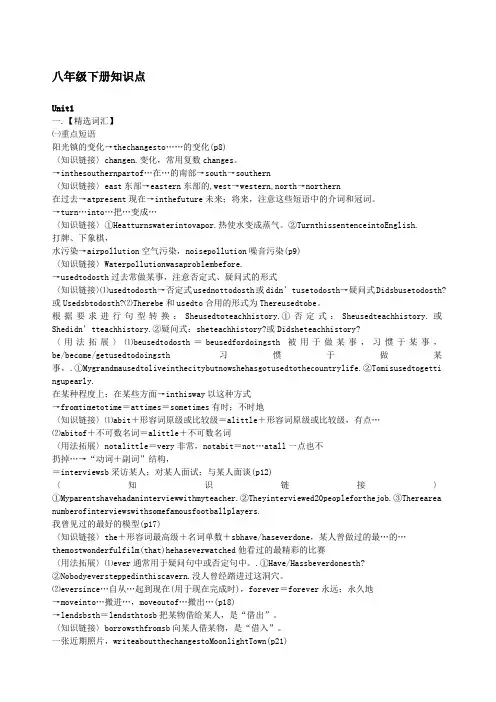
八年级下册知识点Unit1一.【精选词汇】㈠重点短语阳光镇的变化→thechangesto……的变化(p8)〈知识链接〉changen.变化,常用复数changes。
→inthesouthernpartof…在…的南部→south→southern〈知识链接〉east东部→eastern东部的,west→western,north→northern在过去→atpresent现在→inthefuture未来;将来,注意这些短语中的介词和冠词。
→turn…into…把…变成…〈知识链接〉①Heatturnswaterintovapor.热使水变成蒸气。
②TurnthissentenceintoEnglish.打牌、下象棋,水污染→airpollution空气污染,noisepollution噪音污染(p9)〈知识链接〉Waterpollutionwasaproblembefore.→usedtodosth过去常做某事,注意否定式、疑问式的形式〈知识链接〉⑴usedtodosth→否定式usednottodosth或didn’tusetodosth→疑问式Didsbusetodosth?或Usedsbtodosth?⑵Therebe和usedto合用的形式为Thereusedtobe。
根据要求进行句型转换:Sheusedtoteachhistory.①否定式:Sheusedteachhistory.或Shedidn’tteachhistory.②疑问式:sheteachhistory?或Didsheteachhistory?〈用法拓展〉⑴beusedtodosth=beusedfordoingsth被用于做某事,习惯于某事,be/become/getusedtodoingsth习惯于做某事,.①Mygrandmausedtoliveinthecitybutnowshehasgotusedtothecountrylife.②Tomisusedtogetti ngupearly.在某种程度上;在某些方面→inthisway以这种方式→fromtimetotime=attimes=sometimes有时;不时地〈知识链接〉⑴abit+形容词原级或比较级=alittle+形容词原级或比较级,有点…⑵abitof+不可数名词=alittle+不可数名词〈用法拓展〉notalittle=very非常,notabit=not…atall一点也不扔掉…→“动词+副词”结构,=interviewsb采访某人;对某人面试;与某人面谈(p12)〈知识链接〉①Myparentshavehadaninterviewwithmyteacher.②Theyinterviewed20peopleforthejob.③Therearea numberofinterviewswithsomefamousfootballplayers.我曾见过的最好的模型(p17)〈知识链接〉the+形容词最高级+名词单数+sbhave/haseverdone,某人曾做过的最…的…themostwonderfulfilm(that)hehaseverwatched他看过的最精彩的比赛〈用法拓展〉⑴ever通常用于疑问句中或否定句中。
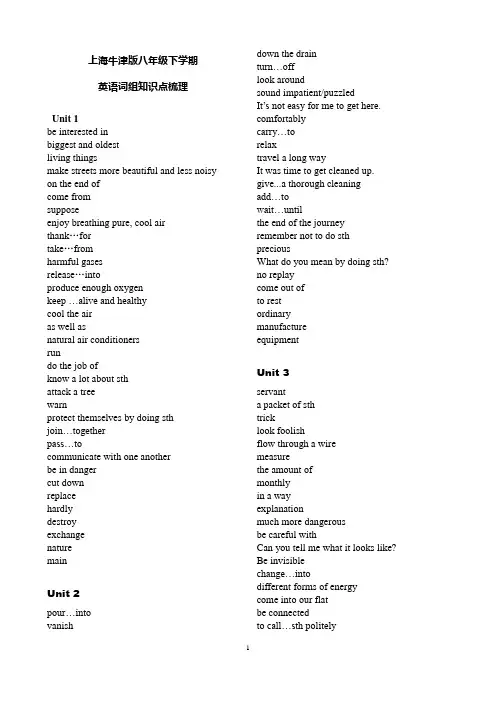
上海牛津版八年级下学期英语词组知识点梳理Unit 1be interested inbiggest and oldestliving thingsmake streets more beautiful and less noisy on the end ofcome fromsupposeenjoy breathing pure, cool air thank…fortake…fromharmful gasesrelease…intoproduce enough oxygenkeep …alive and healthycool the airas well asnatural air conditionersrundo the job ofknow a lot about sthattack a treewarnprotect themselves by doing sth join…togetherpass…tocommunicate with one anotherbe in dangercut downreplacehardlydestroyexchangenaturemainUnit 2pour…intovanish down the drainturn…offlook aroundsound impatient/puzzledIt’s not easy for me to get here. comfortablycarry…torelaxtravel a long wayIt was time to get cleaned up. give...a thorough cleaning add…towait…untilthe end of the journey remember not to do sthpreciousWhat do you mean by doing sth? no replaycome out ofto restordinarymanufactureequipmentUnit 3servanta packet of sthtricklook foolishflow through a wiremeasurethe amount ofmonthlyin a wayexplanationmuch more dangerousbe careful withCan you tell me what it looks like? Be invisiblechange…intodifferent forms of energycome into our flatbe connectedto call…sth politelycontainproduceswitch offlockencouragebehavepolitecustomerUnit 4hold a meeting/be at the meeting decide to do sththe chief editorsuggest that sb (should) do sth vote forelect sb. to betake charge ofought to do sthask for suggestionhave experiencebe secretary oftake notesthe other threebe responsible fortalk…overamongmake a list of sthpublish the paperbe free to pay for sthconsiderbrieflyask whether…have an ideathink about…a bit longermake a decision aboutagree to do sthconcludearrange to do sthin one week’s timeagree onin alltalentgather delightedshamedesigncomplainUnit 5belong toas soon aswalk into someplacebook a roomYou’re welcome.allowsound like…interruptat oncebothlead sb.Personally to…before doing sththe location of the fireexitsafetydescribe sth to sbin one own wordsbe asleepsmell smokego offmust be outsidethe phone was deadalonglay on the floorbesideseem likemoments later/seconds later be safesave one’s lifelendtake caremindlook outwatch outUnit 61. now that: since2. be behind sb3. think about doing sth.4. go abroad国外/ aboard5. why not do sth/Why don’t sb. do sth.6. spread one’s wings7. one of the most popular tourist destinations8. such as / fore example9. wide, tree-lined streets10. the same size as / as big as11. attractions / attractive12. an hour away from/ how far13. the center of Paris14. offer to do sth.15. go on to do sth./ go on doing sth.16. do it without doing sth17. enable…to / be able to do sth. /ability (n.)18. travel…from…to…19. grow crops20. make + adj./ make sb. do sth21. excellent : very good22. used to do sth. 过去常常做某事/ be used to doing习惯于做某23. be famous for24. the influence of ./ have an influence on25. in some way 26. provide sb. for sth./ provide sth. for sb.27. a leader in art and culture ( led- leading)28. a lot of young students from differentcountries go to France29. to further one’s study (why?)30. film festivals, exhibitions and concerts31. throughout the world/all over the world Unit 71. be at home/ be at work2. a boring man/ make me bored3. on the site4. walk on a narrow plank5. scared/scary6. on one’s own: by oneself7. be pleased with (pleasing, pleasure, pleasant)8. be cross/ angry9. pay attention to10. scold sb 11. put sb in detention12. help sb in every way 13. love chatting with sb (talk with)14. be puzzled by sth (puzzling)15. Pretend to do sth.16. concern about17. accept - acceptable18. express -expression19. honest- honesty-dishonest20.patient-patience-impatient-patiently -impatiently。
牛津英语八年级下册单元知识点归纳Unit 1: Routines and HabitsIn this unit, we learned about different daily routines and habits. We discussed how to talk about regular activities using the present simple tense, adverbs of frequency, and time expressions. We also learned how to give opinions and talk about preferences. Furthermore, we practiced asking and answering questions to gather information about others' routines and habits.Unit 2: Leisure ActivitiesDuring this unit, we explored various leisure activities and hobbies. We learned vocabulary related to different sports, games, and pastimes. Additionally, we studied how to express likes, dislikes, and preferences for certainactivities using the present simple and present continuoustenses. We also discovered the importance of stayingphysically fit and engaged in recreational activities.Unit 3: CommunicationThis unit focused on improving our communication skills. We learned about different types of communication such asbody language, gestures, and facial expressions. Additionally, we studied how to engage in effective conversations,including expressing opinions, agreeing, disagreeing, interrupting politely, and giving reasons. We also practiced writing formal and informal letters.Unit 4: Environment and NatureDuring this unit, we explored our environment and the importance of taking care of nature. We studied vocabulary related to environmental issues, such as pollution, deforestation, and climate change. We learned about theimpact of human activities on the planet and discussed waysto become environmentally friendly. Additionally, wediscussed environmental problems at a global level and explored potential solutions.Unit 5: TechnologyIn this unit, we delved into the world of technology. We learned vocabulary related to different types of technology, including computers, smartphones, and social media. We discussed the advantages and disadvantages of technology in our lives, as well as the impact it has on society. We also studied how to express opinions and give reasons regarding technology usage.Unit 6: Travel and AdventureDuring this unit, we explored various aspects of travel and adventure. We learned vocabulary related to transportation, accommodation, and tourist attractions. We practiced asking and answering questions about travel experiences and discussing destinations. Additionally, westudied how to talk about past events using the past simple tense.Unit 7: Media and EntertainmentThis unit focused on media and different forms of entertainment. We explored types of media such as television, movies, music, and books. We learned vocabulary related to these topics and discussed our preferences and opinions. We also studied how to write a film or book review, expressing our thoughts and recommendations.Unit 8: Health and Well-beingIn the final unit of this book, we explored the importance of health and well-being. We learned vocabulary related to health, diet, exercise, and lifestyle choices. We discussed the benefits of a balanced diet and an active lifestyle. Additionally, we studied how to give advice and discuss healthy habits.Overall, the eighth-grade English book covered a wide range of topics, helping us expand our vocabulary, improve our communication skills, and enhance our understanding of various aspects of daily life.。
~8B Unit 1 Past and presentpast n. 意为“过去” in the past 过去(过去时)in the past few years 在过去的几年中present n. 现在,目前at present 目前n.礼物in the future 未来;将来Comic strip &Welcome to the unit1、It was in the bowl an hour ago一个小时之前在碗里的an hour ago 一小时前in the bowl在碗里2. I've just eaten it.我刚才把它吃了。
(eat-ate-eaten)just adv. 意为“刚才” 常与完成时连用。
他们刚刚到达。
They have just arrived.注意:just now 意为“刚才”,相当于“a moment ago”通常与一般过去时连用。
我刚才去了图书馆。
I went to the library just now.3. You used to share food with me! 你过去常与我分享食物!●used to do sth. 意为“过去常常做某事”,表示过去的习惯。
本身已是过去时态,没有人称和数的变化,暗含现在已不再如此。
1) 他的父母过去住在乡下。
His pare2nts used to live in the countryside.2) Tom 过去常常早起,不是吗?Tom used to get up early, didn't he?/ usedn't he?●be used to doing sth.习惯于做某事My father is used to reading newspapers after dinner.●be used to do 被用来做…… A pen is used to write with.笔是用来写的。
Module 4 Seeing the doctorUnit 1知识点精讲1.cough●Point cough [kɒf] n./v.cough 作名词,常用结构:have/catch a cough。
作动词,表示“咳嗽”,不及物动词。
➢—What’s wrong with you? You’re coughing all the time.—I’ve had a bad cough day and night. Perhaps smoking causes my dry cough.2.How can I help you?●Point How can I help you?同义句:What can I do for you?➢Are you in trouble? How can I help you?【延伸】询问他人状态:What’s the matter (with you)?What’s wrong (with you)?What’s your trouble?➢—What’s the matter/wrong with you?—I have a headache.➢—What’s your trouble?—I’ve got a stomachache.3.I feel ill.●Point ill [ɪl] adj.ill 在此作形容词,不用于名词前,通常作表语。
名词形式illness,意为“病,疾病”。
➢We both started to feel ill after the meal.➢He can’t come to the meeting today because he is ill.= He can’t come to the meeting today because of his illness.【辨析】ill/sickill 表示“有病的”,通常用作表语。
Her mother is ill in hospital.sick 表示“生病的”,可用作表语或定语。
最新牛津版英语八年级下册知识点总结单元一:学校生活
- 学校设施:图书馆、实验室、体育馆等
- 学校科目:数学、英语、科学、历史等
- 学校活动:运动会、戏剧表演、音乐比赛等
单元二:生活方式
- 运动与健康:锻炼身体、健康饮食、保持良好惯等
- 节约资源:节约用水、节约用电、环保意识等
- 社交与交流:面对面交流、社交媒体、礼仪规范等
单元三:娱乐与休闲
- 电视节目:新闻、纪录片、综艺节目等
- 电影与音乐:欣赏电影、音乐类型、音乐会等
- 旅游与探险:旅行目的地、文化体验、自然景观等
单元四:科技与创新
- 信息技术:电脑、互联网、智能手机等
- 科学发现:物理、化学、生物等科学领域的新发现
- 创新产品:机器人、无人机、3D打印等先进科技产品单元五:人与自然
- 自然灾害:地震、火灾、洪水等
- 环保问题:气候变化、资源浪费、环境污染等
- 动植物保护:野生动物保护、植物保护、生物多样性等单元六:突破与坚持
- 挑战自我:克服困难、突破自我限制等
- 成功与失败:成功经验、失败教训等
- 毅力与奋斗:坚持不懈、努力追求目标等
单元七:社区服务
- 志愿者活动:社区清洁、慈善义卖等
- 社区设施:公园、医院、商场等
- 社区问题:交通拥堵、垃圾处理、安全问题等
单元八:文化交流
- 多元文化:文化差异、国际交流等
- 文化活动:艺术展览、文化节庆、语言交流活动等
- 传统与现代:传统文化价值、现代文化影响等
以上为最新牛津版英语八年级下册的知识点总结,希望能够对您的学习有所帮助。
八年级牛津下册英语知识点英语作为一门国际通用语言,在现代社会扮演着重要的角色。
学好英语,对我们的学业、职业、进一步的发展、交流等方面都有很大的益处。
而在英语学习的道路上,知识点的积累是很重要的一项任务。
下面就让我们来了解一下八年级牛津下册英语知识点。
一、动词时态在英语的学习过程中,动词时态是我们需要掌握的一个基本概念。
八年级牛津下册英语涉及到了多种动词时态,包括简单现在时、一般过去时、现在进行时、过去进行时、一般将来时、过去将来时等。
在学习时,我们需要通过不断的练习和记忆,以便更好地理解和运用动词时态。
二、名词名词是英语词汇中的基本单位,包括人名、地名、物品、动物等各种实体。
八年级牛津下册英语中有很多名词需要掌握,包括可数名词、不可数名词、单数名词、复数名词等。
在学习时,我们需要理解名词在句子中起到的作用,并通过练习记忆名词的各种形式和用法,以便更好地应用到实际交流中。
三、形容词与副词形容词和副词是描述词和动词性词语的重要类别。
在八年级牛津下册英语中,我们需要掌握形容词和副词的用法、形态和比较级等相关知识。
同时,还需要理解形容词和副词在句子中的位置以及它们的作用,以便更好地表达自己的意思和理解他人的语言。
四、介词介词是连接名词、代词、动词等成语的重要语法概念。
在八年级牛津下册英语中,介词也是一个需要掌握的重要知识点。
我们需要理解介词在句子中的位置和作用,并学习介词的常见用法和相关语法规则,以便更好地使用它们在实际交流中。
五、连词连词是连接词组或句子的语法元素,是英语交流中不可或缺的部分。
八年级牛津下册英语中也涉及到了多种连词,包括并列连词、从属连词、并列副词和连接副词等。
我们需要通过学习和实际交流中的体会,更好地理解连词的作用和用法,以便更好地应用到实际生活中。
总结以上就是八年级牛津下册英语知识点的相关介绍。
在学习英语的过程中,我们需要不断积累和巩固这些知识点,以便更好地理解和使用英语。
同时,我们也需要不断地与他人交流,不断提升自己的英语水平,以便更好地应对各种实际情况和场景。
牛津英语八年级下册知识点梳理TTA standardization office【TTA 5AB- TTAK 08- TTA 2C】八年级下册知识点Unit1一.【精选词汇】㈠重点短语1. the changes to Sunshine Town阳光镇的变化→the changes to… …的变化 (p8)〈知识链接〉change n.变化,常用复数changes。
. Great changes have taken place since 1995.2. in the southern part of town →in the southern part of…在…的南部→south →southern〈知识链接〉east东部→eastern东部的, west →western, north →northern3. in the past在过去→at present现在→in the future未来;将来,注意这些短语中的介词和冠词。
4. turn the place into a park →turn…into…把…变成…〈知识链接〉①Heat turns water into vapor.热使水变成蒸气。
②Turn this sentence into English.5. play cards and Chinese chess打牌、下象棋,. It’s pleasant to play cards and Chinese chess.6. water pollution水污染→air pollution空气污染,noise pollution噪音污染 (p9)〈知识链接〉Water pollution was a problem before.7. used to dump its waste into water →used to do sth过去常做某事,注意否定式、疑问式的形式〈知识链接〉⑴used to do sth →否定式used not to do sth或didn’t use to do sth→疑问式Did sb use to do sth或Used sb to do sth ⑵There be和used to合用的形式为There used to be。
根据要求进行句型转换:She used to teach history. ①否定式:She used teach history.或She didn’t teach history. ②疑问式: she teach history或Did she teach history〈用法拓展〉⑴be used to do sth=be used for doing sth被用于做某事,. Stamps are used to send letters.=Stamps are used for sending letters. ⑵be/become/get used to sth习惯于某事,be/become/get used to doing sth习惯于做某事,. ①My grandma used to live in the city but now she has got used to the country life. ②Tom is used to getting up early.8. in some ways在某种程度上;在某些方面→in this way以这种方式9. feel a bit lonely from time to time →from time to time=at times=sometimes有时;不时地〈知识链接〉⑴a bit+形容词原级或比较级=a little+形容词原级或比较级,有点…⑵a bit of+不可数名词=a little+不可数名词 . a bit of water=a little water〈用法拓展〉not a little=very非常,not a bit=not…at all一点也不10. throw away扔掉…→“动词+副词”结构,. throw it/them away11. have an interview with sb=interview sb采访某人;对某人面试;与某人面谈 (p12)〈知识链接〉①My parents have had an interview with my teacher. ②They interviewed 20 people for the job. ③There are a number of interviews with some famous football players.12. the best model I have ever seen 我曾见过的最好的模型 (p17)〈知识链接〉the+形容词最高级+名词单数+sb have/has ever done,某人曾做过的最…的…the most wonderful film (that) he has ever watched他看过的最精彩的比赛〈用法拓展〉⑴ever通常用于疑问句中或否定句中。
. ①Have/Has sb ever done sth②Nobody ever stepped in this cavern.没人曾经踏进过这洞穴。
⑵ever since…自从…起到现在(用于现在完成时),for ever=forever永远;永久地13. move into the new flats→move into…搬进…,move out of…搬出… (p18)14. lend me a book→lend sb sth=lend sth to sb把某物借给某人,是“借出”。
〈知识链接〉borrow sth from sb向某人借某物,是“借入”。
15. a recent photo一张近期照片,write about the changes to Moonlight Town (p21)16. a tourist attraction旅游胜地→attraction n. 吸引;向往的地方→attract vt.吸引→attractive有吸引力的①It has become a new tourist attraction. ②Hepburn’s beauty and charm attracted Colette’s attention.㈡词汇解析1. 常见的交通工具:bike/bicycle, bus, double-decker双层巴士, coach长途汽车, tram有轨电车, taxi, train, underground, light rail轻轨, plane, hot-air balloon热气球, aero done滑翔机2. Using a dictionary: The words in a dictionary are in alphabetical order from “A” to “Z”. This helps us find the words we want quickly. If two words starts with the same letter, we look at the second letter to decide the alphabetical order. If the first two letters of two words are the same, we look at the third letter, and so on. . The word “ball” comes before the word “banana”.3. century=one hundred years世纪;百年。
⑴某世纪用序数词。
如:21世纪the twenty-first century。
⑵“在某世纪”用介词in,如:in the 20th century在20世纪。
二.【重点句型】1. —Eddie, have you seen my food —Yes, I’ve just eaten it. (p6)2. You’ve changed, Eddie. You were kind. Now you’re not. I don’t want to play with you any more.3. You’ve changed too. You always wanted to play with me. →always+过去式=used to do sth4. Coaches have been in use/service in Beijing since 1958. →have been in use=have been used5. I moved here with my family when I was two years old and have lived here since then. (p8)6. Have you ever moved house →move house搬家7. We lived till 1965, when I got married. →get married结婚→get/be married to sb与某人结婚〈知识链接〉⑴marry sb与某人结婚,. She married a football player. ⑵marry sb to sb把某人嫁给某人,. He married his daughter to an actor. ⑶get/be married to sb和某人结婚,. Yao Ming got married to Ye Li on 6 August, 2007. ⑷表示“已经结婚”用have/has got married,表示“已经结婚多久”用have/has been married for+时间段或since+时间点。
. ①They have got married. ②They have been married for 5 years.不能说成They have got married for 5 years.〈用法拓展〉marriage n.婚姻. They will celebrate their fifty years of marriage next month.8. Has Sunshine Town changed a lot over the years →change a lot变化大〈知识链接〉over the years=in the last/past years这些年来,这是现在完成时的一个标志。